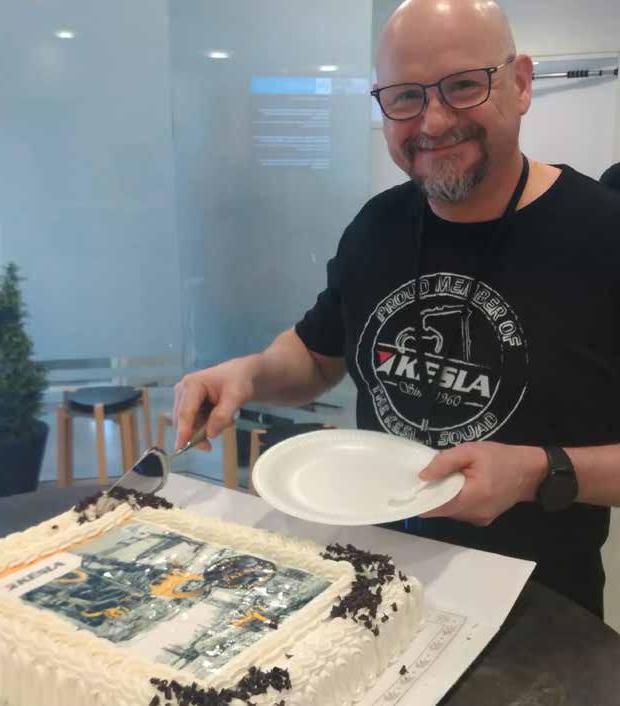
4 minute read
Wild card shuffles the deck
In spring 2019, Kesla CEO Simo Saastamoinen was a little worried. A year earlier, the pulp market had been experiencing peak times. At its best, more than $1,200 per tonne had been paid for long-fibre softwood pulp in 2018. Saastamoinen, who closely followed the trend indicators, thought that the pulp boom would soon be over. And that is what happened. The slowing down of the pulp market was later described by many as a ‘crash’. Kesla prepared for the deterioration of the market situation, and co-determination negotiations were launched towards the end of 2019.
Pandemic
December 2019. The first suspicions of COVID-19 were raised in Wuhan, China. Soon there was talk of an epidemic. Early in the year, the epidemic area of COVID-19 was defined as continental China, Iran, South Korea, Italy, Tirol in Austria and the German state of North Rhine-Westphalia. At the end of January 2020, a Chinese tourist was isolated in Lapland Central Hospital due to COVID-19. About six weeks later, Finland invoked the Emergency Powers Act. The World Health Organisation declared the COVID-19 epidemic a pandemic on 11 March. At Kesla, the anticipation of lay-offs eased the transition to COVID-19 reality. The first quarter of 2020, the company persevered. In April, there was a sharp drop, and the order book dwindled.
Preparation
Remote working, distance education, disbelief In several countries, people’s movements, travel and gatherings were restricted and public spaces and shops were closed. Industry’s concern about the availability of materials and components increased. Kesla was also worried. Although approximately 80% of the materials used by the company are sourced in Finland, there were challenges in tackling production problems.
In April 2020, Kesla announced arrangements to protect the personnel and slow down the wave of contagion. The range of measures included strict hygiene, work space arrangements, remote work opportunities and minimising contacts. Sales and technical support activities were secured, and partners were given full support.
The COVID-19 pandemic shut down air traffic worldwide. As in so many other companies and organisations, Kesla effectively harnessed remote connections. Teams meetings and WhatsApp became an agile part of distance communication with partners and customers. The company operating in the international market was able to improve the clock frequency of communication and the frequency of interaction, as the CEO put it. The strategic choice to use the network of agents in new markets also proved wise from the point of view of COVID-19.
Temporary
Economic crises have different backgrounds. In Finland, banks, businesses and people were devastated by the domestic recession of the early 1990s. The 2008 financial crisis stemmed from subprime mortgage lending in the United States. Low interest rates, loose lending and blind risk-taking by financial institutions pushed the economy downhill.
At the same time, awareness of megatrends grew stronger. Climate change, ageing of the population, technological issues – these are things that appear to Kesla mainly as business opportunities. In the middle of everything, the COVID-19 pandemic confused things in a different way. Unlike megatrends, COVID-19 was described as a wild card – surprising in its suddenness, but not continuous.
Towards growth
Kesla was in remote working mode for a total of five months and felt the effects of COVID-19 throughout the year. In April, the slump was deep. In hindsight, it was said that people came back to work after the summer holidays with too optimistic expectations. August was slow, and it would have been wise to continue with the lay-offs. When the media reported promising new vaccines from around the world in late 2020, the turn of the COVID-19 crisis seemed to be at hand.
Exchange rates started to rise. Stock exchange movements were monitored at Kesla more closely than the EU region’s GDP figures – for good reason. About three-quarters of Kesla’s turnover comes from the EU.
Towards the end of the year, positive signals strengthened; we were nearing better times. Kesla’s order book strengthened. The Russian market showed signs of recovery. The Belarusian market developed favourably. The strengthening of the Swedish krona exchange rate stimulated trade to Sweden. In the success column, the cancellation of lay-offs of people who worked in the client interface when the COVID-19 pandemic eased slightly was another big plus. The people who returned to work worked hard, and Kesla’s sales grew sharply.
Right direction
Kesla has demonstrated its flexibility and adaptability in the context of the financial crisis and COVID-19. The CEO describes Kesla’s agility as follows: “Evolution also proves it – even the biggest and strongest dinosaurs didn’t do as well with changes as the most adaptive ones.”
Attention is again shifting more strongly from the wild card of COVID-19 to megatrends that bode well for Kesla’s business. The COVID-19 pandemic has prompted people to think about climate change and look for alternatives to fossil raw materials. When COVID-19 is finally beaten, the world will continue to strive for growth. Kesla, which was selected in December 2020 in the top ten finalists of Finland’s EY Entrepreneur of the Year competition, will do the same. A total of 54 growth companies sought to make it to the finals in the competition, which evaluated the company’s value base, management, strategy and growth and success. “Getting into the finals is a sign that we are moving in the right direction, and at the same time it challenges us to further improve our operations.” That was how CEO Saastamoinen and Veli-Matti Kärkkäinen, Chairman of Kesla’s Board of Directors, verbalised their satisfaction at the competence of Kesla’s entire team and the capture of the place in the final ten.

Kesla’s plans for the 60th anniversary were largely postponed by a year. However, we were able to have some birthday cake with the personnel during the summer lull of COVID-19. In the photo Simo Saastamoinen, the CEO, cutting cake.










